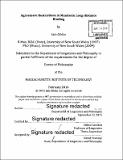Agreement restrictions in Mandarin long-distance binding
Author(s)
Giblin, lain
DownloadFull printable version (14.94Mb)
Other Contributors
Massachusetts Institute of Technology. Department of Linguistics and Philosophy.
Advisor
Sabine Iatridou.
Terms of use
Metadata
Show full item recordAbstract
This thesis investigates the distribution of the Mandarin reflexive ziji. Ziji displays many interesting properties but its long-distance binding distribution has long been of interest to linguists. Ziji displays a blocking effect such that certain arrangements of person features prohibit long-distance binding. In this thesis I argue that the blocking effect pattern is the well-attested Person-Case Constraint (PCC). I argue that ziji is a SE anaphor that is syntactically bound through the agreement system and that the PCC blocking effect emerges when intervention effects disrupt the agreement system that mediates the binding relationship between an anaphor and its antecedent. The conditions required for the syntactic binding of ziji can be explained in terms of an interaction between three processes. First, there is a condition on how the [phi]- features on CO can be valued. C0 bears a [+participant] feature, which it seeks to value subject to CONTIGUOUS AGREE (Nevins, 2007). Second, there is a process of inheritance of the [phi]-features on C0 by all lower instances of TO, following and extending Chomsky (2005, 2008). Finally, there is a condition on the relation between the [phi]-features borne by a particular instance of T and those of its specifier, inspired by Bejar and Rezac's (2009) condition of Match. Because Mandarin T bears no overt agreement morphology, the [phi]-features inherited by T need not correspond to the [phi]-features of its specifier. However, when ziji is not syntactically bound as a SE anaphor it displays a different distribution and it can be used as a SELF anaphor and as a logophoric pronominal.
Description
Thesis: Ph. D. in Linguistics, Massachusetts Institute of Technology, Department of Linguistics and Philosophy, February 2016. Cataloged from PDF version of thesis. Includes bibliographical references (pages 249-259).
Date issued
2016Department
Massachusetts Institute of Technology. Department of Linguistics and PhilosophyPublisher
Massachusetts Institute of Technology
Keywords
Linguistics and Philosophy.